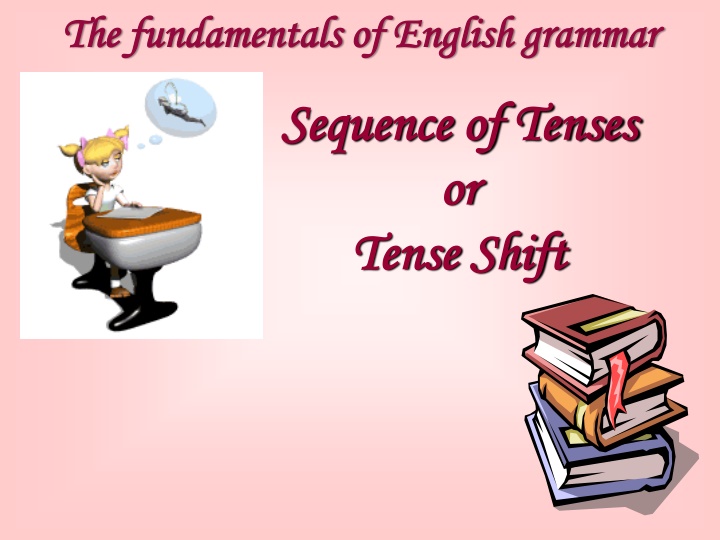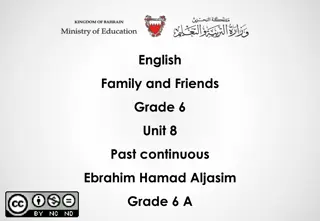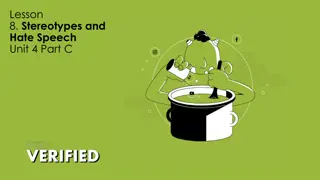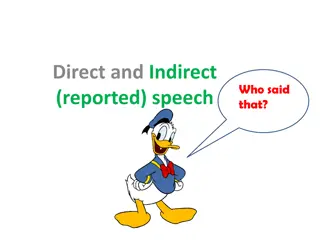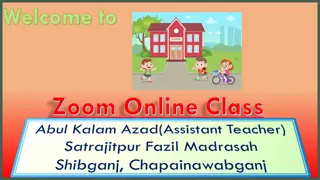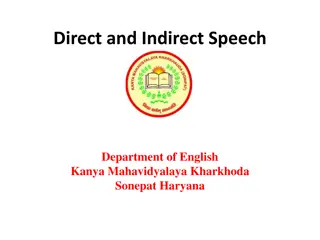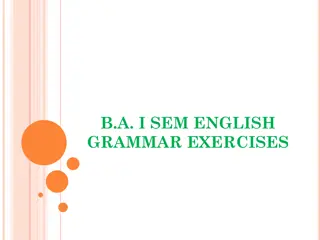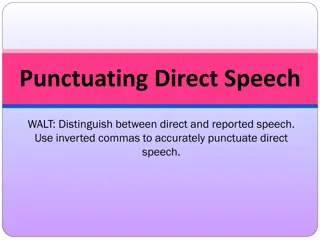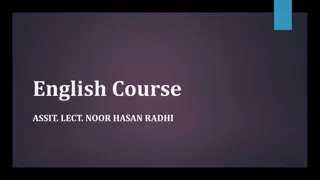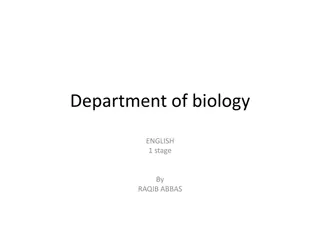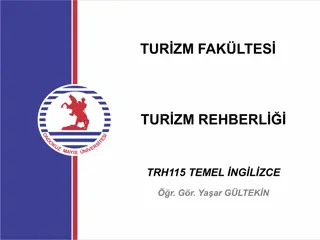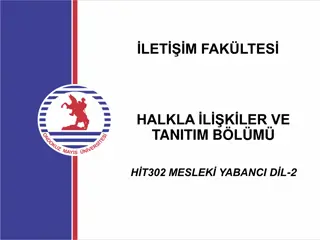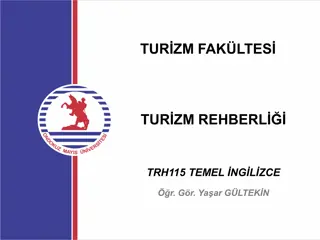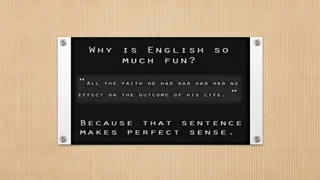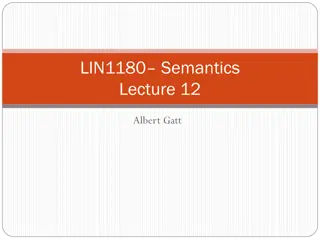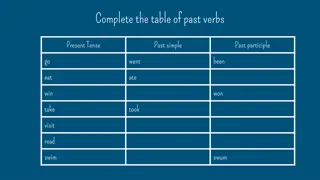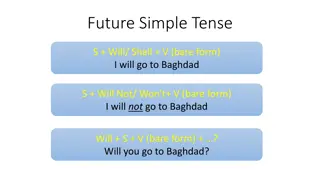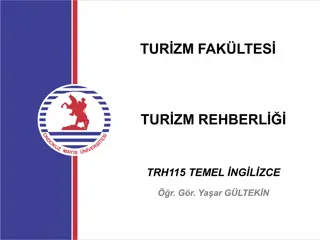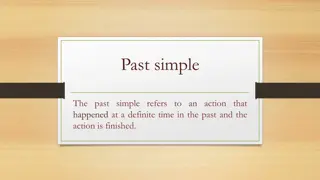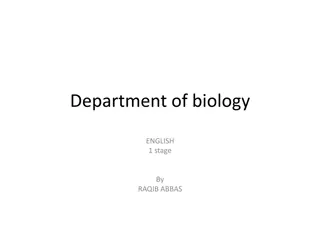English Grammar Essentials: Tense Shift and Direct Speech
Delve into the fundamentals of English grammar, exploring sequence of tenses and tense shifts. Learn about direct and indirect speech transformations, understanding how to shift tenses effectively. Discover the nuances and rules behind statements in present, past, and future tenses. Uncover the use of modal verbs like can, could, and may to express different degrees of possibility. Enhance your grasp of English grammar through this comprehensive guide.
Download Presentation

Please find below an Image/Link to download the presentation.
The content on the website is provided AS IS for your information and personal use only. It may not be sold, licensed, or shared on other websites without obtaining consent from the author.If you encounter any issues during the download, it is possible that the publisher has removed the file from their server.
You are allowed to download the files provided on this website for personal or commercial use, subject to the condition that they are used lawfully. All files are the property of their respective owners.
The content on the website is provided AS IS for your information and personal use only. It may not be sold, licensed, or shared on other websites without obtaining consent from the author.
E N D
Presentation Transcript
The fundamentals of English grammar The fundamentals of English grammar Sequence of Tenses Sequence of Tenses or or Tense Shift Tense Shift
Direct and Indirect Speech Direct and Indirect Speech Present Past , : (one step back) , , . Jane says: I m reading the Encyclopedia now. Jane says that she is reading the Encyclopedia now. Jane said that she was reading the Encyclopedia then. Tom tells me: My sister lost her laptop yesterday. Tom tells me that his sister lost her laptop yesterday. Tom told me that his sister had lost her laptop the day before. Rita thinks: it will rain tomorrow. Rita thinks that it will rain tomorrow. Rita thought that it would rain the next day.
Tense Shift Tense Shift Statements Present Present Past Simple Past Simple V2/ed Present Simple Present Simple V/Vs Present Continuous Present Continuous is/am/are + Ving Past Continuous Past Continuous was/were + Ving Past Perfect Past Perfect Present Perfect Present Perfect had + V3/ed have/has + V3/ed Present Perfect Continuous Present Perfect Continuous Past Perfect Continuous Past Perfect Continuous have/has+ been Ving had + been Ving
Tense Shift Tense Shift Statements Past Past Past Perfect Past Perfect had + V3/ed Past Simple Past Simple V2/ed Past Continuous Past Continuous Past Continuous Past Continuous was/were + Ving Past Perfect Past Perfect Past Perfect Past Perfect had + V3/ed Past Perfect Continuous Past Perfect Continuous Past Perfect Continuous Past Perfect Continuous had + been Ving
Tense Shift Tense Shift Statements Future would will Future Future Simple Future Simple will + V Future Simple in the Past Future Simple in the Past would + V Future Continuous Future Continuous Future Continuous in the Past Future Continuous in the Past will + be Ving would + be Ving Future Perfect in the Past Future Perfect in the Past Future Perfect Future Perfect will + have V3/ed would + have V3/ed Future Perfect Continuous Future Perfect Continuous in the Past in the Past would + have been Ving Future Perfect Continuous Future Perfect Continuous will + have been Ving
Modal Verbs can could may might must had to have/has to had to should = should ought to = ought to Dan noted: I can speak different foreign languages. Dan noted that he could speak different foreign languages. Mary said: I may buy a new phone tomorrow. Mary said that she might buy a new phone the next day. Terry said: I must consult my doctor next week. Terry said that he had to consult his doctor the following week.
Remember: say tell add note notice remark explain complain reply remind think , , . now then yesterday the day before tomorrow the next day last year the year before next year the following day (a week) ago (a week) before this that today that day tonight that night these those here there say tell , .
But , , : : 1) Our teacher explained to us that the Earth moves round the Sun. Our teacher told us that water boils at 100 degrees C. 2) He said that he was born in Washington in 1995 and soon his family moved to New York. 3) - . The view is breathtaking, he said. He said that the view is breathtaking.
4) , when since Mike said: I haven t met Susan since we went to the party. Mike said that he hadn t met Susan since they went to the party. He remarked: She was crying when I came in. He remarked that she was crying when he came in. 5) 2 3 ( ). He said he wished he was a film star. I wish I was a film star, he said.
Questions . General questions General questions if ( ) Ann said: Does your sister often attend a sports club? Ann asked if my sister often attended a sports club. Mike said: Did you go clubbing yesterday? Lisa said: Will you prepare for the project tomorrow? Mike wondered if I had gone clubbing the day before. Lisa wanted to know if I would prepare for the project the next day. Wh Wh- -questions questions , Tom said: What are you doing now? Tom wondered what I was doing then. Kate said: How did you spend this weekend? Mary said: What country will you choose to travel next summer? Kate asked how I had spent that weekend. Mary wanted to know what country I would choose to travel the following summer.
Commands and requests ( to + ) The doctor advised me to give up drinking fizzy water. The doctor said : Give up drinking fizzy water. Mother told her daughter: Don t speak so loudly. Mother asked her daughter not to speak so loudly. A man said to the waiter: Could you bring me some salad? A man ordered the waiter to bring him some salad. ask, advise, tell, warn, order, remind, allow, recommend
